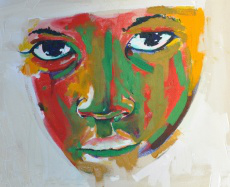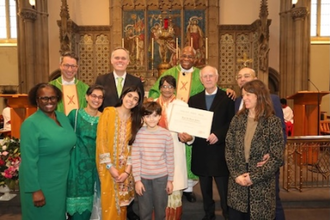Covid-19 is causing increase in human trafficking

image by Luke Teague
Source: Caritas Internationalis
In time for World Day against Trafficking in Persons, on 30 July, Caritas Internationalis and Christian Organisation Against Trafficking (COATNET) have released a statement in which they point out that the number of victims of trafficking is increasing because of Covid-19. They urge governments to intensify efforts to do more to identify victims of trafficking and clamp down on this exploitation.
Caritas Internationalis' secretary general, Aloysius John, said: "at this moment of Covid-19, we denounce a preoccupying reality for vulnerable people and increase in risk of trafficking. Focused attention on the pandemic must not prevent us from taking care of the people most vulnerable to trafficking and exploitation. And this is what local Caritas and COATNET member organisations are doing all over the world, along with other civil society organisations, providing much-needed safety nets for victims of trafficking and exploitation, even during the pandemic, and accompany them in their difficulties, offering material, medical, legal and psychological help."
The Catholic confederation, with 162-member organisations, and the Christian anti-trafficking network says the global pandemic has focused governments' attention on health, but at the same time not sufficient attention was paid on the collateral damage of the ongoing pandemic especially on migrants and informal workers, who are now more exposed to trafficking and exploitation. Caritas Internationalis and COATNET also call for urgent and targeted measures to support workers in informal sectors such as domestic work, agricultural and construction work, where most vulnerable workers (i.e. undocumented migrants) can be found.
There are several socio-economic effects of the ongoing pandemic, many of which contribute to aggravating the phenomenon of human trafficking and exploitation, which according to the International Labour Organization (ILO) is affecting more than 40 million people in the world.
The governments' measures to prevent the spread of COVID-19 had a major impact on the capacity to earn a living of the informal workers who are consequently more vulnerable to trafficking and exploitation. For these workers, job loss has also resulted in the loss of housing to live in.
Caritas Spain warns: "The current health crisis has pushed thousands of people living in substandard housing into extreme living conditions. The state of emergency has worsened the risk of homelessness for agricultural seasonal workers who cannot comply with hygiene and social distancing measures and who have no food because lockdown means they can't work."
Securing housing is currently an important form of prevention against trafficking, as Caritas Ecuador says: "In addition to promoting food security, we have also advocated for the right to access to housing and avoid forced evictions due to unpaid rent. Through this involvement, Caritas has sought to reduce the risks that the migrant and refugee population are exposed to human trafficking, especially related to labour exploitation."
Lack of freedom of movement caused by lockdown and travel restrictions means that human trafficking victims in many countries have less chance of escaping and finding help when they are held in situations against their will. Among them, there are many victims of trafficking for sexual exploitation. Domestic workers also face increased risks economically, and also physically and psychologically, as they are even more cut off from society during the pandemic.
Gabriel Hatti, president of Caritas Middle East and North Africa regional office, also highlights the difficult situation experienced in Lebanon and other Middle East countries by "many Filipinos and other foreign workers, who are struggling to return home after losing their job because of the COVID-19 pandemic and the current economic crisis. They are now lining up in front of their embassies, without any social material or psychological protection and many of them do not even have a legal status."
Children are also one of the main victims of the consequences of the pandemic, in terms of exploitation and trafficking. The confinement measures caused a sharp increase in cases of violence against minors.
During lockdown in India, 92,000 cases of child abuse were reported to authorities over the course of just 11 days. Caritas India says that "there has also been an increase in cases of child labour and child marriage. Due to the difficult economic conditions, families marry off their young daughters so there's one less mouth to feed."
Moreover, in countries and areas where schools are the only source of shelter and food for millions of children, as a result of school closure many children are being forced onto the streets to search for food and money, increasing their risk of being exploited. Serious dangers also come from the Internet, as, without proper parental control, many children who currently use the internet for home schooling can be easily lured and exploited.
Lockdown measures also result in decrease in efficiency of identification of cases of trafficking and exploitation as Secours Catholique - Caritas France highlights: "During the confinement period, it has been very difficult to locate people who are exploited. As there have been fewer checks by the police and associations have not been able to identify people we expect an increase in trafficking victims to emerge after this crisis."
In addition, due to the economic crisis caused by the ongoing pandemic, many organisations providing services to victims of trafficking face decrease or even interruption in financial support to ensure service provision.
Caritas Internationalis and COATNET:
- urge governments, as a matter of priority, to provide victims of human trafficking with access to basic services, in particular shelters and support hotlines, access to justice and to support organisations that take care of them.
- ask institutions and civil society organisations to provide children with protection from the abuse and exploitation, in particular through internet
- ask governments, in this time of Covid-19, to put in place urgent and targeted measures to support workers in informal sectors and to intensify efforts in identifying victims of trafficking and exploitation, through greater control and measures such as labour inspections.
- and urge all people to be vigilant and to denounce cases of human trafficking and exploitation
*COATNET is the network of 46 Christian organisations engaged in combating human trafficking. It is a global network and comprises Caritas, other Catholic Church organisations such as Bishops Conferences and religious congregations, as well as organisations of other Christian denominations. The network provides opportunities for its members to exchange knowledge and experience, as well as develop joint actions and advocacy on behalf of members.
LINKS
COATNET - www.coatnet.org
Caritas Internationalis - www.caritas.org/


















